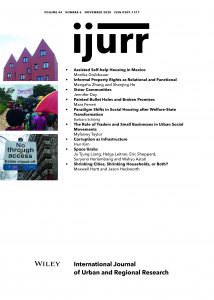Low‐income municipal housing and its inhabitants have increasingly been construed as disposable within wider global dynamics of real estate speculation, leading to heightened housing insecurity, displacement and forced evictions. In Western cities urban regeneration programmes have long provided the framework for partial or wholesale demolition of public housing, drawing new frontiers of gentrification and accumulation by dispossession. Before and beyond the material loss of home, the dispossession of low‐income housing involves a deeper unmaking of the relations that constitute residents’ emplacement and political legitimacy. In this article, I present a thick ethnographic account of multiple registers of dispossession and their implications for resistance through a situated reflection on the process of ‘decanting’—as resident rehousing is colloquially known—in a South London council estate, The Heygate. Drawing on participation in an anti‐gentrification archive as a scholar‐activist, I move beyond issues of displacement and grief to analyse three key mechanisms that make becoming dispossessed possible: disowning, disavowal and the administration of differential disposability. Within a resurgent interest in municipal solutions to housing crises, there is an urgent need for understanding municipal dispossession and the role of residents and engaged scholarship in resisting and expanding imaginaries of housing justice.

